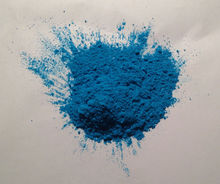Copper(II) acetylsalicylate
 |
This article is a stub. Please help Sciencemadness Wiki by expanding it, adding pictures, and improving existing text.
|
Copper(II) acetylsalicylate, or copper aspirinate, as it is sometimes called, is a compound of copper and acetylsalicylic acid (aspirin).
Contents
Properties
Chemical
This little-known compound is a chelating agent that shows promise as a drug for rheumatoid arthritis.
Physical
Copper aspirinate is a richly colored blue solid that is insoluble in water.
Availability
Copper(II) acetylsalicylate is produced in the lab, rather than obtained elsewhere.
Preparation
Copper(II) acetylsalicylate can be produced by the combination of solutions containing a copper(II) salt and sodium acetylsalicylate in a 1-to-2 molar ratio, respectively.
Projects
Copper aspirinate may be usable as a blue pigment for various projects. It is also an intriguing specimen to add to a copper compounds collection.
Handling
Safety
Copper aspirinate does not demonstrate the toxicity of most copper(II) compounds. However, lab grade material should never be ingested. Additionally, large amounts of salicylate can cause a serious medical condition, salicylism.
Storage
Copper aspirinate should be stored in closed containers.
Disposal
Copper aspirinate can be mixed with a flammable solvent and safely burned. It can also be neutralized with Fenton's reagent if needed.
The resulting copper wastes should be recycled.
